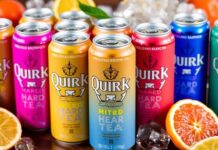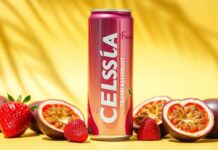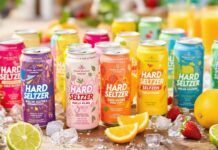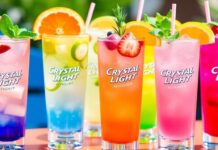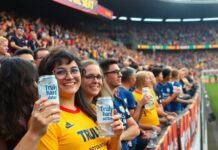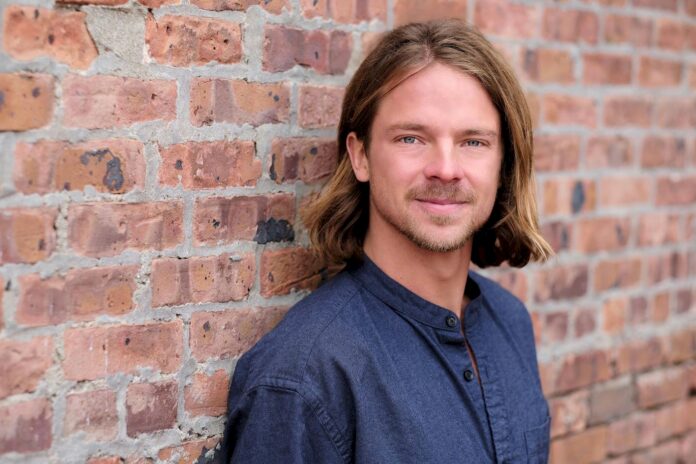Hard Seltzer News recently interviewed Nico Enriquez, co-founder of Willie’s Superbrew hard seltzer.
Willie’s Super Brew was accepted into the Chobani Incubator 2017 Program. Can you tell me a bit about the program, and how your hard seltzer line grew out of that opportunity?
The Chobani Incubator was incredible. We were in the second cohort. We were super lucky to be involved in that because I think only about one percent of companies are accepted [sic]. It was [sic] an incredible program because Chobani is an incredible company. Throughout the program they basically make anyone in the company available to you to speak [with] and offer advice. So, you could talk to Leland who was the head of marketing, [sic] you could talk to their head of sales, or you could talk to the people who were doing supply chain and trying to figure out how to make trucks run on time. [We could talk about] any piece of a company that’s scaling at our level. At that time, we were two years in, and we had five people on the team. Now, we’re at 17 people and we’ve doubled sales in just the last couple years. [Chobani] really helped us set ourselves up — with, say, how do you build a stable scalable company — by having that kind of wisdom consistently available. [They’d say], “Oh, you’re going to run into this issue, if you think about it that way.” The other thing that was huge is [they helped identify] values that you should be thinking about, [and explained] how companies can make a positive impact. [This] is something we were really aligned with and a part of the reason why I think they accepted us [into the program]. They really helped us map our vision and build a company that has a higher purpose. When we started, we weren’t a hard seltzer with real fruit. We hadn’t had that clarity of how [to] message what we were making. We were just making a product that was an alternative to beer, that tasted very good [and] that was made with ginger and lemon instead of grain. What they helped us do is look at our product and say, “Ok, people love it because we use real ingredients, because we made them with integrity and because it’s light and fresh and low calorie.” And what is the product that does that? That’s a hard seltzer with real fruit. Now that we can explain our product in one sentence and say we make hard seltzer with real fruit, it’s the kind of thing that you can put on your package and have it billboard wherever you are across the market and not have to have someone explaining it over 40 sentences. So, that’s a really key thing that they helped us do is [simplify] our message and [make] it resonate, on the shelf [and] on the package. [In that way,] we don’t have to hand sell every piece, which is what we were doing before the Chobani Incubator.
You made $20,000 through kickstarter in 2015, so you’re grassroots funded. What were the challenges of working from the ground up to build the company?
It was definitely an adventure, and we had no idea what we were getting into. That first summer we started with Willie’s recipe out of his kitchen, and it was an incredible recipe. But, scaling it from one to five gallon batches in a kitchen, to 1,000 to 10,000 gallon batches, is a crazy process. I’d come from the synthetic biology world. So, I’d worked in biology and basically tried to use lab processes to [answer] how do you make something consistent and scalable with the right quality control, so that every customer that tries it, has a consistent, good product. That was the first step — how do we scale our recipe. That started with homebrewing and [sic] talking to a hell of a lot of people across the beer industry — interviewing any brewer we could find, reading any forum we could find, and saying we’re going to test in this way to get to scale. The other thing that was really important was not just making it consistent, but also just [figuring] out the whole supply chain. Like, how do you even sell to a liquor store? Or, what’s a distributor’s margin that they take? How do you market your product and get a package to a place? So, we [had] all these bumps and mishaps on the way. [With] the first batches we made, we bought 300 pounds of ginger from supermarket wholesalers. We didn’t have any equipment, and we didn’t have any money, so we [sic] borrowed three small kitchen cuisinarts from our friends’ parents. [We] spent literally 12 hours grinding ginger straight for one day and had basically second degree burns from the amount of ginger we had on our hands because it’s a very strong product. It’s basically just whatever hustle and blood and sweat and tears [sic] — not actual blood, sorry — but sweat and tears we could put into making [the] product work. That was [what] the first couple years [were like] — we’re just going to hustle. We didn’t have as good a plan as we do now. Now, we’re in a really good spot. We’ve doubled each year, our company is incredible, the team is incredible and we have clear values. We have good guidance [now] and at the beginning it was just, “Let’s figure it out.”
You say you didn’t have very much equipment, so when you first started what kind of equipment were you working with while you were starting to scale?
At the beginning, it was really just glass carboys and five gallon fermenter buckets — you know, like the classic homebrew set up. [We used] a large bayou burner, one of those outdoor grilling burners that you can use to boil large pots. So, that was [sic] our basic system. Plus, obviously, all the basic sanitization stuff. You need your sani and all that jazz. As we scaled, we started actually working with Downeast Cider. After we’d figured out how [to make the product] consistently at five gallons and 20 gallons, [when then had to figure out] how do we then make it in a 100 gallon batch. We [sic] worked with their team to say, alright, let’s make a 100 gallon batch, and let’s put it into a couple of small tanks that are on the side. We learned a lot from cider because [sic] we were making hard seltzer before anyone had ever really thought about fermenting cane sugar bases. At the time, it was very like grain is the only thing you can ferment, or apples were the only thing you could ferment, or grapes are the only thing you ferment. Now, things have changed like crazy, but there was no literature or art on how do you ferment cane sugar because [it was] a new source. So, we had to do a lot of lab testing and [figure out] how do we make a very clean beautiful base that doesn’t have off flavors — because it’s a new environment for yeast, and yeast isn’t made for that simple of an environment. That took a lot of learning from apples, because they are very simple sugars as well. That was why it was super helpful to work with Downeast. We are very grateful for a lot of our start coming from working and collaborating together and using their equipment at the beginning to try and learn that.
You’ve had significant growth from selling at Farmers markets to now being available in 9 states. What’s in the future for Willie’s Superbrew, the hard seltzer, and expanding to other states?
So, our focus is, really, we want to be the leading North East hard seltzer. We want to be the leaders in craft in hard seltzer. So, that means that we’re not actually trying to expand across the country and go as fast as we can. We want to build an authentic, real brand that makes the best possible product and do it in a very focused way. So, [sic] we’re not trying to add states next year. We’re actually trying to do innovative, new products and [sic] last year we made the first seasonal hard seltzer there ever was — pear and cinnamon. We’re bringing that back this month, and then we’re going to rotate in a new [Spring] seasonal [sic] next year, as well as [try] to do some innovation that’s a bit wild and out there for seltzer. The way I see it, [sic] the seltzer category is where craft beer was in the 90’s, where before, beer was always these lagers and scaled up products, and everyone was just trying to make this consistent liquid that’s kind of the white claw equivalent, right? And what came after that was the craft brewers saying no, we can break this system. We can make flavors no one’s ever seen. We can make it in formats no one’s ever seen, and we can give customers an experience that’s [sic] a true connection to the local community. And that’s really what we’re trying to focus on, is let’s bring in new ingredients. Let’s learn from the styles and innovations of craft beer — doing stuff like barrel ageing, or doing stuff like double blends, or doing a collaboration, or doing stuff that’s a benefit for local communities. Last year we cleaned 195 miles of beach on Cape Cod in June as part of our initiative to [sic] make something that actually helps the local community we started in. Let’s expand that now. Let’s do that also with our products. How do we align our efforts and our soul with the product that we’re bringing to the market? That’s really the focus.
What sort of marketing strategies and decisions have been put in place to align with health & wellness conscious consumers and conservation values?
The biggest thing that guides our company is our values, first. This informs all of our marketing. So we have 5 values: [sic] foster growth, no bullshit, have a soul, be curious and innovative and live responsibly. That’s how we hire people in the company, and that’s who I want to be as a person. That’s the product we want to represent. After that, what we’re trying to do is use that to build an authentic brand that actually supports its communities. So, we have three pillars [sic] that we think differentiate us from other companies. [First,] we have a true founding story. We are based off of real people, not starting out of a board room, and we bring that in one sentence, “Started out by a surfer and a goat farmer.” Me being the surfer, and Willie being the goat farmer. The second is, we use real fruit. Other hard seltzers [are] using natural flavors, quote, unquote, which [sic] can be anything basically [sic]. It’s really confusing because it’s titled “natural flavors” so it’s like, “oh, it’s probably good.” We use real fruit and that’s why we make the most award winning hard seltzer in the world right now because we were the first people doing that. So, that’s our second pillar. Use good ingredients, and use real fruit. The third is, we want to have a real impact. So, that’s where the beach clean up last year [came from]. Trying to clean every beach on Cape Cod is something that’s key. We want to engage our local communities and do it with environmental stewardship. What we are going to be doing is expanding that beach clean across more states in New England and trying to really make a movement where we have a very effective [platform of] let’s come to our local communities, let’s make them beautiful and let’s actually feel like we can make an impact on the environment ourselves and take care of it. For me, as an individual, [sic] environmental causes are so overwhelming because there’s so much that’s going wrong and such a large ship that’s moving in the wrong direction, that it often feels like we can’t make a difference. And that’s what we are trying to do here. So, I think that links to your question of the conscious consumer because what we’re trying to do is embody in a larger [way] the more we can unify people and build a vehicle for creating positive change, the more that we can help conscious consumers make the choices they want to make already. It’s very difficult to make [those choices as] a conscious consumer. So, that comes with using real ingredients and giving them a product that — instead of using chemical and natural flavor bases — you use real fruit. You use real mango puree, and that means that [consumers] have an easier choice. They can say, I have the product I want because I can choose ingredients and I can actually read them and know what they are. Ok, the same thing is happening there with sustainability. Where we can say, “Oh I’m overwhelmed and I have no idea how I can make an impact on building a sustainable planet,” well, get involved in your local community and get your friends together. [Do] that so that then there’s a feeling that we all can build momentum for the next thing. I don’t pretend, and we don’t pretend, that cleaning every beach on Cape Cod, or cleaning every beach across New England, is solving environmental issues. But, it is building a positive change where people feel empowered to make more change and that’s the hope of our company. We’re not the be all and end all of this, [it’s not] the end and we’ve solved everything — it’s more [that] we are a small step on the other steps behind us to getting to a better future.
You were on Forbes list of 30 under 30, and you and Willie met over a decade ago…Would have made you a teenager when you first met Willie and tried his brew! Can you talk a little bit about this friendship turned business partnership?
Willie is a true legend because he chose to live in the woods in the Cape and farm goats. [He’s] one of those guys where when I first met him on the beach, he was reading a Doystoyevsky novel and just sitting alone. Like, literally! But, he’s like a shorter farmer who keeps to himself and is [a] salt of the earth in New England type guy. So, i met him because his sister Teressa set up a volleyball net everyday of the summer — and still does to this day — but, back then she started doing it, and I was this little kid who showed up and started playing volleyball with this crew, and Willie was one of the people who would play. So, we started playing volleyball, I started going over to their house for dinner after these games, and after a while I finally cracked who Willie was cause he was very shy from me. Teressa and I would always chat and the reason [Willie and I] started talking was because he shared his ginger beer with me that he was brewing in his kitchen. It was kind of like a kombucha style thing at the time, and it was a flavor that I had never seen, and honestly no one was making at the time. So, I was like, for years, “Willie we should sell this! This is insane! This is a flavor that no one’s ever made!” And he was like, “Yeah, yeah, right, Nico, ok.” I mean it was just kind of a fun thing to make — it was just like a hobby at the time. But, I kept hammering him and being like “Willie we should do this!” and he [started being] like “You know what? Alright, I’m in. Let’s do it.” When I was in college and I was trying to figure out my life, he and I had a serious chat about where we were both going. It ended up coming to the point where we were like, let’s actually try the ginger beer. And let’s see what happens, and we’ll just throw it all to the wind, and hope and let’s raise this Kick Starter. So, it all kind of started with [sic] us just chatting around the dining room table, [sic] hoping that it could work and then not knowing at all how much work it would be and how difficult it would be. And, unfortunately, Willie passed away last year in October — which was [sic] part of why we did the beach clean up — [it’s] ts something that I’m still trying to navigate as a leader in the company because we represent Willie through his name and we represent his legacy and who he was, but we also represent a larger team and a product and something that’s continuing to evolve and hopefully [sic] keep growing. How do you represent the legacy of an individual through a company and do that in a way that’s honorable and truly represents how great Willie was? [It’s] a question that I don’t think we’ll ever answer perfectly, but it’s part of what guides the goal of having a positive impact and the clarity of that is why we are here. It came from unfortunate circumstances, but it’s a good thing, I think, overall, for what we can do for the planet and making a positive force.
Is there anything else you’d like to add or make sure we know? Any new things coming up? Or anything you’d like to plug?
I’d say the biggest thing is we’d love anyone who wants to be involved with the company, [to get involved], especially because we’re going to bring the beach clean ups back next year and we’re going to expand them a lot. So, if you want to be involved in that clean up effort, I’d say that’s the biggest thing that I would love to plug. Get involved in your local community. Get involved with us if you want, but just try to make positive change. And also, don’t be afraid to make a jump….Hard seltzer is a great industry to be in but there’s so many other places to bring positive change. So, if I can help you with that you can shoot me an email — it’s nico@superbrew.com — and I’m happy to chat.
- Podcast: New Realm’s Mitch Steele Talks Hard Seltzer - March 8, 2021
- Big Brands Bring Awareness with Publicity — in the Market or in the Courts - February 27, 2021
- Naked Seltzer Betters the Home Bar - February 26, 2021


